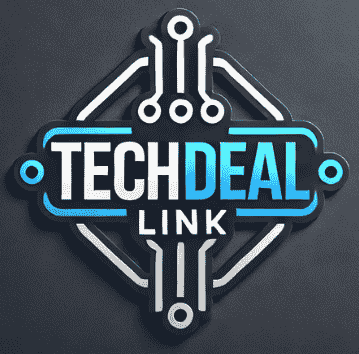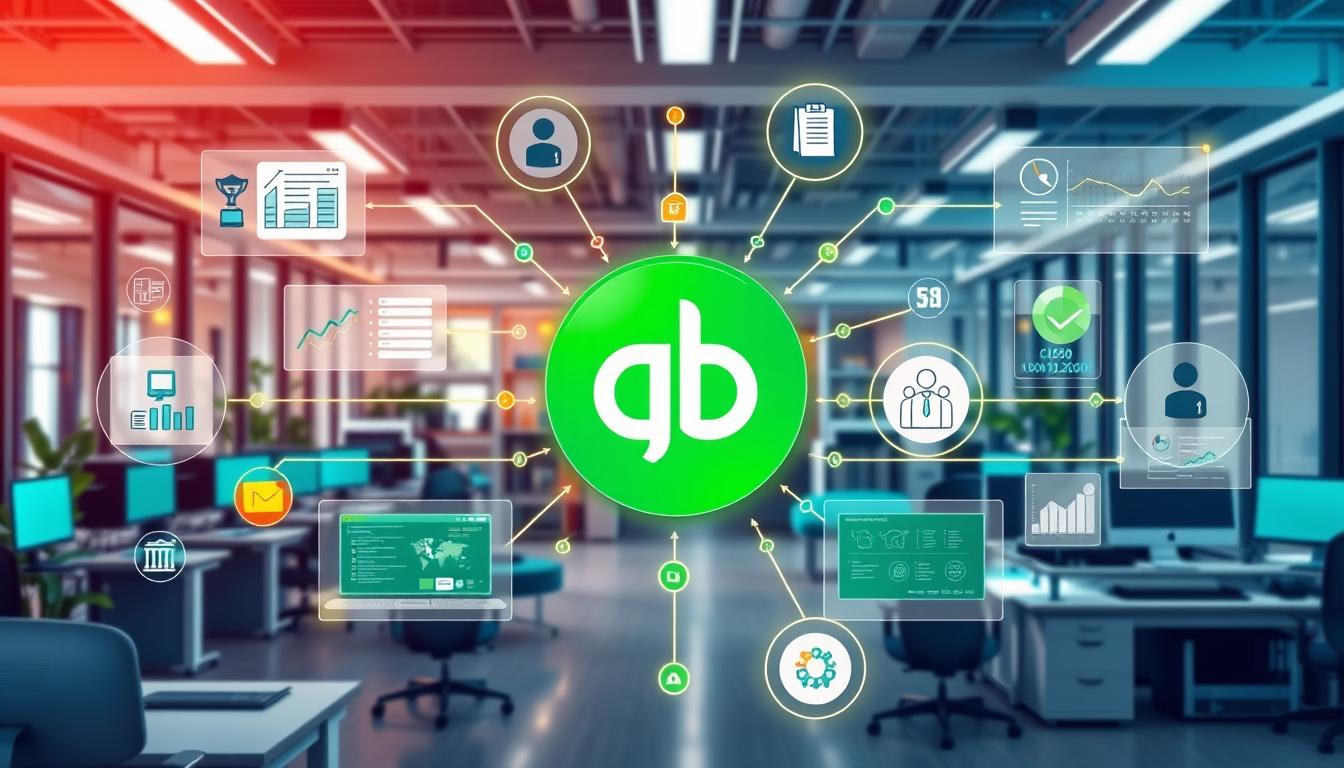QuickBooks is a well-known accounting software for small and medium-sized businesses. But, as these businesses grow, they wonder if QuickBooks can be an Enterprise Resource Planning (ERP) system. Or if they need a more detailed ERP solution. We’ll look at the main differences and similarities between QuickBooks and ERP systems. This will help you decide if QuickBooks can be an ERP system for your business.
Key Takeaways
- QuickBooks has many financial management tools, like invoicing and payroll integration. It also has advanced reporting. These features are similar to some ERP functionalities.
- ERP systems handle all business aspects, including project management and supply chain. QuickBooks mainly focuses on financial tasks.
- Big companies usually need ERP systems more. But, small-to-midsize businesses might find QuickBooks cheaper and effective for their needs.
- QuickBooks can grow with third-party app integrations. This adds features like inventory control and project management, making it more like an ERP system.
- But, QuickBooks has limits compared to full ERP solutions. It has less integration and advanced analytics capabilities.
Understanding ERP Systems and Their Functions
ERP systems are all-in-one software for businesses. They handle finance, human resources, supply chain, and customer service. These systems help big and medium-sized companies work better and make smart decisions fast.
What is an ERP System?
An ERP system is a central place for a company’s key functions and data. It brings together important business areas. This makes companies more efficient, helps them make better choices, and improves teamwork.
Key Features of ERP Solutions
- Centralized data management: ERP systems keep all important business data in one place. This makes sure data is correct and easy to find.
- Process automation: ERP software does routine tasks like invoicing and inventory tracking. This cuts down on mistakes and saves time.
- Real-time reporting and analytics: ERP systems give detailed, up-to-date info on how a company is doing. This helps in making smart choices.
Benefits of Using an ERP System
- Improved efficiency: ERP systems make business processes smoother. This cuts down on waste and boosts productivity.
- Better decision-making: With real-time data, ERP systems help make choices based on facts.
- Enhanced collaboration: ERP systems make it easy for different teams to share info and work together.
ERP systems are key for companies to reach their goals and stay ahead in the market. They help automate and integrate business functions.
| ERP System | Starting Price | Key Features |
|---|---|---|
| NetSuite ERP | $99/user/month | Hundreds of third-party add-ons, feature sets for multiple industries, highly customizable |
| Dynamics 365 Business Central | $70/user/month | Combined ERP and CRM, integrations with Microsoft applications, similar interface to MS Word and Outlook |
| Acumatica Cloud ERP | $1,800/month | Open architecture for rapid integrations, multi-entity support, mobile accessibility |
These ERP systems show the wide range of options for businesses. They help small and big companies alike.
Introducing QuickBooks: An Overview
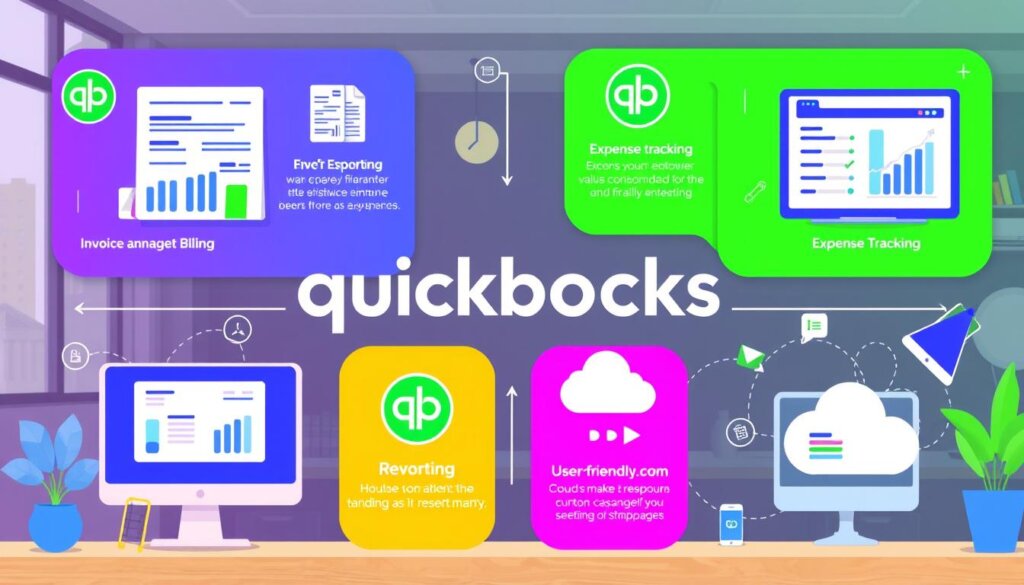
QuickBooks is a well-known accounting software for small and medium-sized businesses. It was created by Intuit. QuickBooks has many tools to help manage finances and run a business smoothly. It’s not a full ERP system but still offers many benefits for financial and operational growth.
What is QuickBooks?
QuickBooks is a flexible accounting software for small and growing businesses. It’s easy to use, making it great for entrepreneurs and finance experts. QuickBooks handles tasks like managing accounts, invoicing, tracking expenses, and basic inventory.
Core Features of QuickBooks
- Financial Management: QuickBooks makes it easy to track financial transactions and manage cash flow.
- Invoicing and Billing: It helps create professional invoices and track payments.
- Expense Tracking: QuickBooks lets you record and categorize business expenses.
- Inventory Management: It offers basic inventory tracking and reporting.
- Reporting and Analytics: QuickBooks has many financial reports and lets you create custom ones.
QuickBooks is great for small to medium-sized businesses to manage finances and operations. But, as businesses grow, they might find QuickBooks limits. They might then look for more advanced ERP solutions.
Comparing QuickBooks and ERP Systems
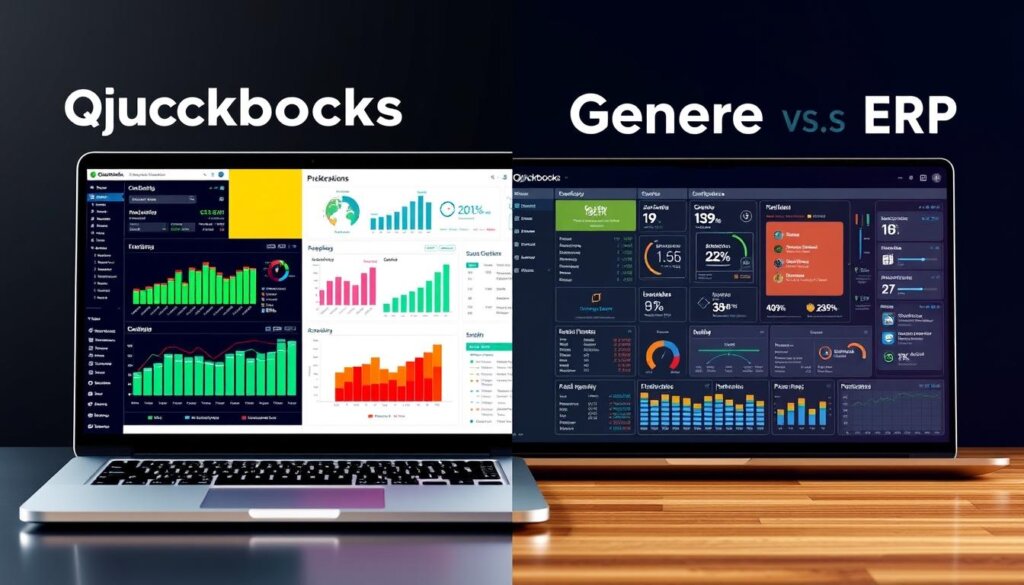
QuickBooks and ERP systems have some features in common, but they are different. QuickBooks is great for small businesses, focusing on accounting and finance. ERP systems, on the other hand, manage everything for big companies. They have modules for sales, making, inventory, and people.
Key Differences Between QuickBooks and ERP
- Scope of Features: ERP systems do more for a company, while QuickBooks focuses on finance.
- Scalability: ERP systems grow with big businesses, but QuickBooks might struggle as a company gets bigger.
- Industry-Specific Capabilities: ERP systems have special features for certain industries, but QuickBooks is more general.
- Data Integration: ERP systems connect data easily across functions, but QuickBooks might need third-party tools.
Similarities Between QuickBooks and ERP
QuickBooks and ERP systems have some things in common. They both do basic financial reports, manage inventory, and connect with other apps. Even QuickBooks Enterprise has some ERP-like features, like better inventory and job costing.
| Feature | QuickBooks | ERP Systems |
|---|---|---|
| Financial Management | ✓ | ✓ |
| Inventory Management | ✓ | ✓ |
| Reporting and Analytics | ✓ | ✓ |
| Integrated Modules | Limited | Extensive |
| Scalability | Limited | High |
In summary, QuickBooks and ERP systems are similar but different. ERP systems are better for big companies. QuickBooks is good for small businesses with simple needs. But, it doesn’t have all the features and integrations of ERP systems.
QuickBooks’ Capabilities: Is It ERP-Like?

QuickBooks is a top accounting software with many ERP-like features. It has tools for managing finances, inventory, and reporting. This makes it a good choice for businesses looking for an all-in-one solution.
Financial Management Features
QuickBooks has strong financial tools, like handling multiple currencies and taxes. It also offers advanced reporting. These features help businesses track their money and make smart decisions.
Inventory Management Tools
QuickBooks helps manage inventory with features like tracking average costs and alerting for negative stock. These tools are great for keeping track of stock and improving supply chains.
Reporting and Analytics Functions
QuickBooks has a dashboard with cash flow insights and customizable reports. These tools help businesses make informed decisions. They offer detailed reports and analytics, similar to ERP systems.
Even though QuickBooks isn’t as comprehensive as some ERP systems, it’s still a good choice for many businesses. But as companies grow, they might need a more advanced ERP system to meet their needs.
The Target Audience for QuickBooks

QuickBooks is a top choice for small to medium-sized businesses. It has over 7 million online subscribers. It’s best for companies with 10 to 100 employees, known as the mid-market segment. Intuit, QuickBooks’ maker, keeps improving it to meet their needs.
Small Businesses vs. Large Enterprises
QuickBooks works great for small businesses but might not be enough for big ones. Its prices start at $30 a month for solo owners and go up with more features. This shows it’s mainly for small to mid-sized businesses.
On the other hand, quickbooks enterprise vs erp solutions are better for big companies. They offer more features and can grow with the business.
Industry-Specific Usage
- QuickBooks is a hit in retail, manufacturing, and wholesale. It handles financial, inventory, and reporting well.
- The construction industry loves QuickBooks too. It has special features for managing projects and costs.
- QuickBooks is used in many industries. Companies with 1-10 employees to 5,000-10,000 employees use it. They make from 0M-1M to over 1,000M in revenue.
Intuit is working on adding more features like advanced analytics and HR. They want to make QuickBooks even better for its main users. They also want to offer quickbooks enterprise vs erp solutions for bigger companies.
QuickBooks Add-Ons: Expanding Functionality
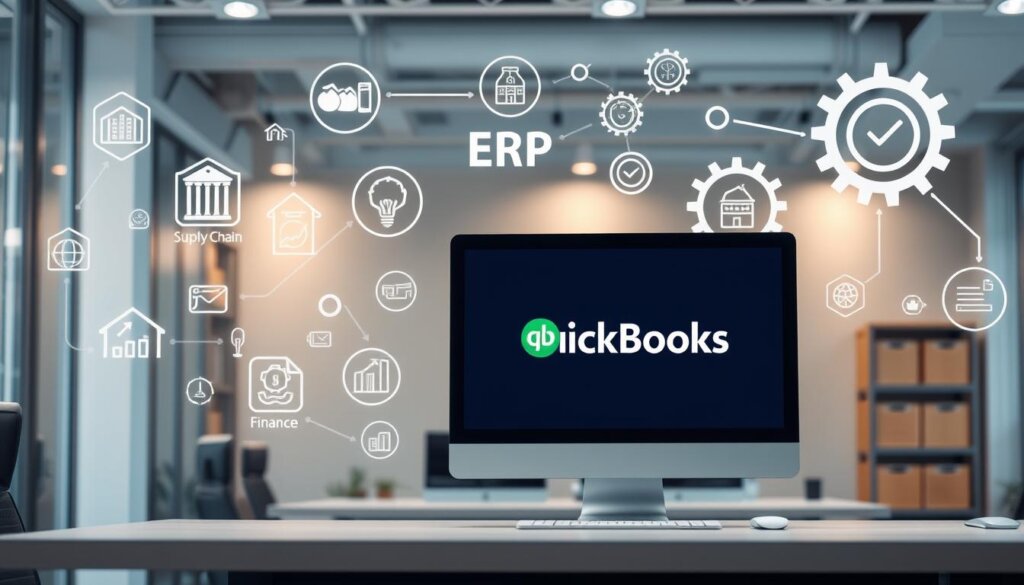
QuickBooks is a strong accounting tool, but it gets even better with third-party apps. These add-ons help QuickBooks manage tasks like time tracking and inventory control. They also improve supply chain management.
Integrations with Other Software
Apps like Transaction Pro or SOS Inventory boost QuickBooks’ supply chain skills. Integrations with CRM, HR, and field service systems make QuickBooks work like an ERP system.
Potential for Enhanced ERP-Like Features
QuickBooks Online Advanced has top ERP features. It offers advanced Custom Report Builder and financial reporting. Users can make detailed reports and manage user roles.
For a full ERP solution, add QuickBooks to platforms like Acctivate. Acctivate brings real-time inventory control and better data flow. This makes operations smoother and reduces errors.
QuickBooks also works with Tipalti for payments, Shopify for e-commerce, and Avalara AvaTax for taxes. QuickBooks Time and EBizCharge are for employee and payment management. These integrations give QuickBooks users many ERP features.
“QuickBooks Online Advanced offers key ERP functionality with a proven, intuitive user interface.”
Limitations of QuickBooks as an ERP System
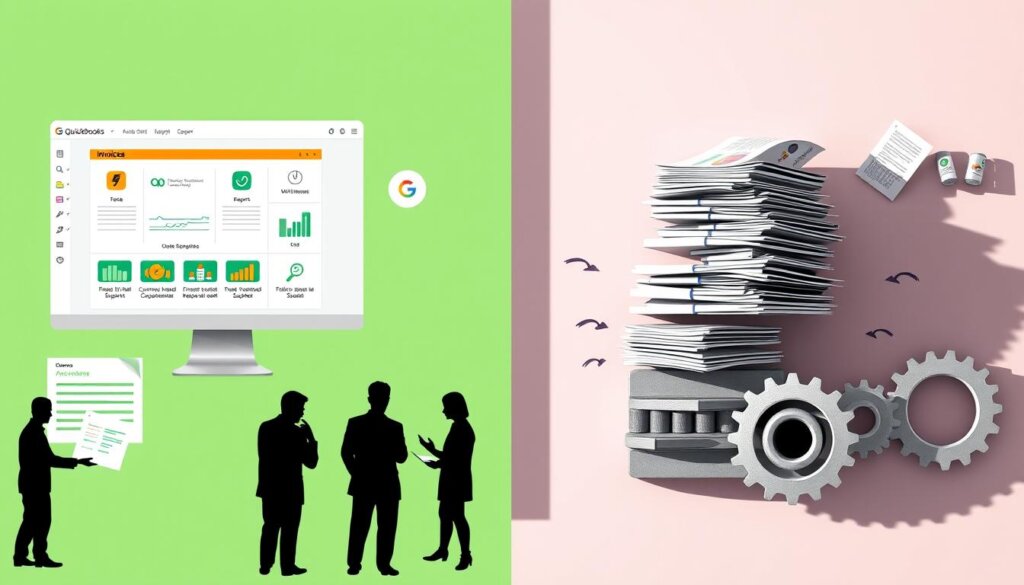
QuickBooks is a well-known accounting software, but it’s not a full ERP system. As businesses grow, QuickBooks might not meet their needs. This could mean switching to a more complete ERP solution.
Scalability Concerns
QuickBooks is designed for small businesses. It can struggle with growth or large teams. It lacks the features and infrastructure for big operations.
Functionality Gaps
QuickBooks is not as good as ERP systems in some areas. It doesn’t have features like lot tracking or barcode scanning. It also can’t handle complex supply chains or advanced resource planning.
Its reporting is limited, making it hard to get real-time financial insights. This is crucial for making smart business decisions. QuickBooks also doesn’t offer much in terms of invoice customization.
Inventory management is another area where QuickBooks falls short. As orders increase, tracking materials and finished goods becomes harder.
Switching to an ERP system can solve these problems. ERPs offer better financial reporting, streamlined workflows, and scalability. They also help in making better decisions by integrating business functions.
QuickBooks is great for basic accounting in small and medium businesses. But, it has its limits as companies grow. Looking into quickbooks vs popular erp systems can help find the right fit for a business’s needs.
Case Studies: QuickBooks in Action
Small businesses have found success with QuickBooks as an alternative to full ERP systems. These stories show how QuickBooks can meet the needs of simple operations. But, they also show its limits for complex needs or fast growth.
Small Business Success Stories
An engineering firm in Toronto, Canada, moved from QuickBooks to Microsoft Dynamics 365 Business Central. They wanted better efficiency and customer satisfaction. QuickBooks couldn’t handle their volume, leading to slow performance and missing insights.
It also struggled with inventory management, causing stock issues and delays. The firm chose Microsoft Dynamics 365 Business Central for its advanced features. This move streamlined their operations, saved time, and improved productivity.
They now have real-time financial and inventory insights. This led to better customer satisfaction and higher profits.
Comparisons to Full ERP Implementations
The Chicago Wine Company had problems with QuickBooks, like order errors and late deliveries. This shows the downsides of relying on QuickBooks. On the other hand, the engineering firm’s switch to Microsoft Dynamics 365 Business Central was a game-changer.
It overcame QuickBooks’ limitations, bringing better efficiency and customer satisfaction. These stories stress the need for a thorough needs analysis before choosing an ERP system. The right partner and data quality are also key to success.
These success stories show the benefits of moving from QuickBooks to a full ERP system. They highlight cost savings, productivity gains, and better customer satisfaction. This makes the transition worthwhile for growing businesses.
Choosing Between QuickBooks and an ERP Solution
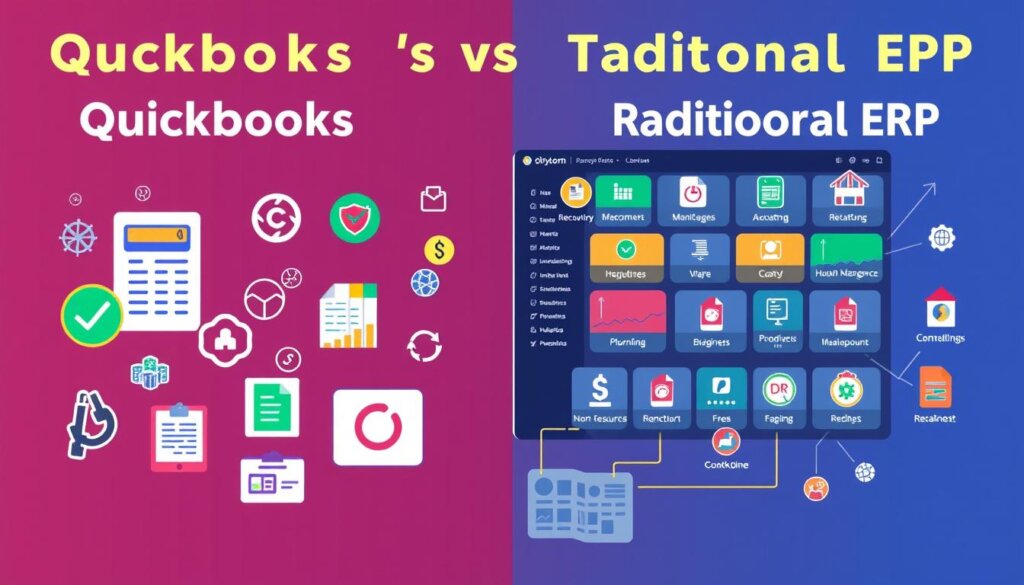
Deciding between QuickBooks and an ERP system is tough. Both have their own benefits. Your business’s size, complexity, and growth goals play a big role in this choice.
Factors to Consider
Think about your business size, operation complexity, and future growth. QuickBooks is great for small businesses because it’s easy to use and has all the accounting tools you need. But, as your business grows, you might need more from an ERP system.
Cost Considerations
Cost is a big factor. QuickBooks is cheaper upfront and scales well, which is good for tight budgets. ERP systems cost more at first but offer more features and can make operations smoother. When looking at quickbooks erp pros and cons, consider the total cost over time.
Choosing between QuickBooks and an ERP system depends on your business’s needs now and in the future. Look at the costs and benefits of each carefully.
Real User Experiences of QuickBooks
QuickBooks is a favorite among small businesses for its ease of use and affordability. But, as businesses grow, they find QuickBooks can’t handle their complex needs. Real user experiences show both the good and bad sides of QuickBooks as an ERP (Enterprise Resource Planning) system.
Testimonials from QuickBooks Users
Many small business owners love QuickBooks for its simple design and affordable price. They say it’s great for tracking money, making financial reports, and handling payroll. One user said, “QuickBooks is the most user-friendly ERP system I’ve used. It’s a lifesaver for a small business like ours.”
Common Challenges Faced
But, not everyone is happy with QuickBooks’ QuickBooks ERP capabilities. Those who’ve used more complex ERPs say QuickBooks lacks advanced features. A user said, “While QuickBooks is great for basic accounting, it falls short when it comes to the depth of analytics and reporting that we need as our business grows.”
Another big issue is QuickBooks’ ability to grow with the business. As companies get bigger, they find QuickBooks can’t handle their needs for inventory, supply chain, and more. A business owner noted, “We had to integrate multiple systems with QuickBooks to achieve the level of visibility and control we needed, which added significant complexity and cost.”
These experiences highlight the trade-offs of using QuickBooks as an ERP solution. It’s good for small businesses but can’t handle complex tasks. This often means moving to a dedicated ERP system as the business grows.
Future of QuickBooks in the ERP Market
Intuit, the maker of QuickBooks, is working hard to make its accounting software better. They plan to add new features to meet the needs of small and medium-sized businesses. This will help QuickBooks stay strong against its competitors in the ERP market.
Upcoming Features and Updates
Intuit has some exciting updates coming for QuickBooks. They will improve inventory management, reporting, and analytics. They also plan to make it easier to connect with other business software.
By listening to what customers want, QuickBooks aims to offer more tools. These tools will help businesses manage their finances and operations better.
QuickBooks’ Position Among Competitors
QuickBooks is a top choice for small to medium-sized businesses. But, it might face tough competition from more advanced ERP systems. These systems are better suited for large companies with complex needs.
Yet, QuickBooks remains popular because of its easy-to-use interface and affordable prices. It also offers features tailored to specific industries. This makes it a great choice for businesses looking for value without sacrificing functionality.
As the ERP market changes, QuickBooks must keep up to stay competitive. By meeting the needs of its customers and using its strong brand, QuickBooks can stay a key player. It will be a top choice for small and growing businesses that need both advanced features and simplicity.
Conclusion: Is QuickBooks a Viable ERP Solution?
QuickBooks is not a full ERP system but can be a good choice for small to medium-sized businesses. It’s strong in financial management and easy to use. It works well for companies with simple operations and not too much complexity.
Final Thoughts on Using QuickBooks as ERP
QuickBooks is great for managing finances in small businesses. But, it’s not the best for complex tasks like inventory management or supply chain. Adding other systems can help, but it won’t be as smooth as a real ERP system.
Ideal Scenarios for QuickBooks Use
QuickBooks is best for small businesses, startups, and companies in retail or service. It’s good for those who focus on accounting and basic inventory. It’s easy to use and cost-effective. But, as a business grows, it might need a more advanced ERP system.
FAQ
What is the primary difference between QuickBooks and a full ERP system?
Can QuickBooks be used as an ERP alternative for small businesses?
What are some of the key ERP-like capabilities of QuickBooks?
What are the limitations of using QuickBooks as an ERP system?
How does the cost of QuickBooks compare to a full ERP system?
What types of businesses are best suited for using QuickBooks as an ERP alternative?
How can QuickBooks expand its ERP-like functionality?
Thomas Steven is a 15 Years of experience digital marketing expert. He covers all things tech, with an obsession for unbiased news, reviews of tech products, and affiliate deals. With his experience, Thomas helps consumers choose what and how to buy from evaluating products by features, ease-of-use, cost-effectiveness or customer care allowing them to make intelligent purchasing decisions in the dynamic world of technology.
